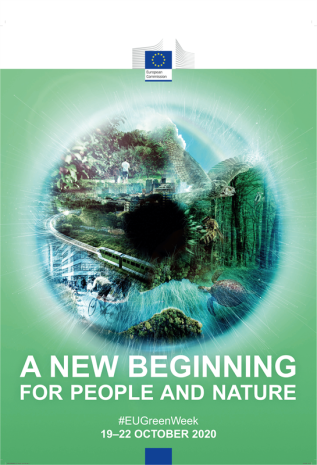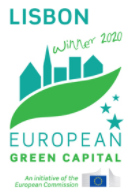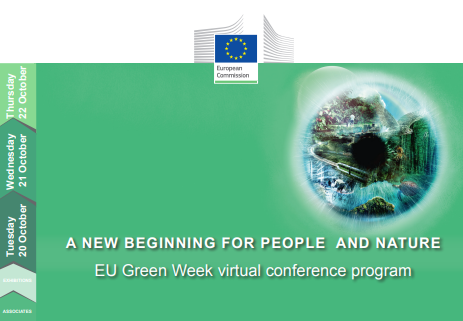EU Green Week 2020: A New Beginning for People and Nature - UNEP and CBD Participation
European Commission
Event details
Description
EU Green Week 2020 will take place from 19-22 October 2020 under the theme of nature and biodiversity.
Background:

This year’s Green Week will also act as a milestone on the path to the Conference of the Parties (COP 15) to the Convention on Biological Diversity, now planned for 2021, where world leaders will adopt a 10-year action plan for biodiversity – a new global deal for people and nature.
The United Nations Environment Programme (UNEP), the Secretariat of the Convention on Biodiversity (CBD) and several other UN entities will be participating in various parts of the programme, both at the official opening event in Lisbon on 19 October and at the fully virtual Conference in Brussels from 20-22 October. Below is an overview of the sessions UNEP and CBD will be participating in or are co-organising.
To attend these conferences prior registration is required:
For the Lisbon conference on 19 October please register HERE
For the virtual conference 20-22 October please register HERE
We also recommend the many virtual partner events across Europe taking place ahead of, during or shortly after EU Green Week. Find out here.
One of these events was held on 25 September. Mr. Harald Egerer, Head of UNEP Vienna office Secretariat of the Carpathian Convention, gave a keynote presentation at the webinar ‘Green Carpathians’ organised by the project consortium of Interreg CE Centralparks, together with the Interreg DTP projects TransGREEN, ConnectGREEN, the recently launched projects Interreg DTP SaveGREEN and LIFE SwiPE, as well as the Carpathian Convention. For more information about this event see here.
Overview of the sessions at which UNEP and CBD officials will be participating(please check the official programme for latest versions):
Opening Event Lisbon, Portugal Monday, 19 October 2020

SOLUTIONS FOR A BIODIVERSE AND EQUITABLE WORLD
14:45 Reducing deforestation and forest degradation, Mario Boccucci, Head of the UN-REDD Programme Secretariat
16:30 Round table discussion with Henrique Miguel Pereira, Mario Boccucci, Francisco Moreira, Paulo Magalhães – Chair, Teresa Pinto Correia, Univ. Évora
17:40 Susan Gardner, Director of Ecosystems Division, UNEP
17:50 Elizabeth Mrema, Executive Secretary of the Secretariat of the Convention on Biological Diversity
EU Green Week Virtual Conference, 20-22 October 2020
Day 2 Wednesday, 21 October 2020

Trading, consuming and keeping exotic animals – including many taken from the wild – increases the potential for the translocation of invasion alien species affecting biodiversity, as well as zoonotic diseases affecting human and animal health.
While the EU policy on invasive alien species is effectively addressing priority species, action is still scattered on pathways of introduction and spread of invasive alien species such as the pet trade. Measures against wildlife trafficking have become a priority issue in Europe, but more needs to be done. The Convention on International Trade in Endangered Species of Wild Fauna and Flora (CITES) still meets enforcement problems rendering it less effective than it could be. It is clear that there is room for improvement of current efforts and mechanisms in order to curb negative impacts on biodiversity and health. How can we face today’s challenges? Come and hear about it in a series of lightning talks and pose all the questions you have to our experts.
Speakers:
- Doreen Robinson, Chief for Wildlife, UNEP
- Ilaria Di Silvestre, Wildlife Programme Leader, Eurogroup for Animals
- Stefan Hetz, on behalf of the European Pet Organization (EPO)
Moderator: Anya Sitaram, Moderators Europe
12:00-13:00 3.2 Nature restoration: a win-win for biodiversity and climate. In partnership with the WWF and UNEP
The biodiversity and climate crises are inextricably linked. As environmental degradation accelerates, so too does climate change, which in turn presents an existential threat to world wildlife. By the same token, protecting and restoring Europe’s natural ecosystems will help solve the biodiversity crisis and stop climate breakdown, helping us adapt to some changes that are now inevitable. One recent study suggests that ‘nature-based solutions’ could provide over a third of the cost-effective climate mitigation needed between now and 2030 keep warming below 2°C.
Join this interactive session to discuss the interlinkages between the twin crises and how EU policies can bring Europe’s nature back.
Speakers:
- Ester Asin, Director WWF European Policy Office
- Luc Bas, Director IUCN Brussels
- Jessica Micklem, Co-founder and Coordinator of GYBN Europe+
- Cristina Romanellia, WHO, Interagency Liaison, joint work programme on biodiversity and Health
- Joy A. Kim, Senior Economic Affairs Officer, UN Environment Programme
- Eva Mayerhofer, Lead Environment and Biodiversity Specialist, European Investment Bank
Moderator: Rene Wyndham, Moderators Europe
14:00-15:00 4.2 The Ocean and COVID-19
The impact of COVID-19 raised many questions about our relationships with nature and biodiversity, including our seas and oceans. Marine ecosystems provide essential services, giving us seafood and half of the oxygen we breathe, trapping our greenhouse gases, and providing a beautiful seascape for our recreation. But these precious habitats are suffering from decades of ill-treatment and neglect. Today, however, seas and ocean are increasingly viewed as part of the solution to our woes, a source of untapped bio-medical opportunities, and home to a blue economic sectors that can help support the economic recovery.
This session will see a panel of speakers reflect on links between the ocean and COVID-19, how the pandemic influenced human uses of the sea and what can we learn from it. The panellists will share their knowledge about marine life and the key human pressures it is facing. They will also reflect on how good management of the marine environment can bring our seas to cleaner, healthier and more productive state. Looking at the positive side of things, the COVID-19 pandemic strengthens the importance of preserving marine ecosystems and biodiversity.
Speakers:
- Vera Coelho, Senior Director, Advocacy in Europe, Oceana
- Brian O'Riordan, Executive Secretary, LIFE Platform (Low Impact Fishers of Europe)
- Monika Gail MacDevette, Chief, Chemicals and Health Branch, Economy Division, UNEP
- Mathew White, University of Exeter/University of Vienna
Moderator: Aminda Leigh, Moderators Europe
16:30-17:30 4.4 Protecting biodiversity and nature through a circular economy
Over half of global GDP depends on nature and the services it provides. Despite that, more than 90% of biodiversity loss and water stress come from resource extraction and processing of materials, fuels and food. A resource-efficient circular economy, by contrast, would be an important tool to halt biodiversity loss and protect nature. This spring, the Commission adopted three major policies under the European Green Deal: the Circular Economy Action Plan, the Biodiversity Strategy and the Farm to Fork Strategy. Together, they will serve as our roadmap to rebuild our economy in a resilient and green way.
This session will focus on the connection between the circular economy, biodiversity and nature, and will take a closer look at how the circular economy and the new circular economy action plan can help to halt biodiversity loss. This will be an interactive session aiming to leverage all the different perspectives and experience of the people in the room.
Speakers:
- Janez Potočnik, member of the International Resource Panel
- Eduardo Mansur, Director for the Office of Climate Change, Biodiversity and Environment, FAO
- Pierre Victoria, Senior Executive Vice President Strategy & Innovation, Veolia
- Etelle Higonnet, Etelle Higonnet, Mighty Campaign and Legal Director, Mighty Earth
Moderators:
- Maria Rincon, Team Leader, Circular Economy, Sustainable Production, Products & Consumption Unit, Directorate-General for Environment, European Commission
- Paola Migliorini, Deputy Head of Unit, Sustainable Production, Products & Consumption, Directorate-General for Environment, European Commission
“What gets measured, gets done” said the President of the Commission when presenting the European Green Deal. The EU Biodiversity Strategy for 2030 calls for sound science, knowledge, monitoring, reporting and assessment to underpin progress. Data on biodiversity and indicators will be improved through better in-situ monitoring, mapping, modelling and the digital transformation. Citizen science will contribute data and knowledge to complement the improvement of the evidence base for policy making. The Commission is launching, in close cooperation with the EEA, a Biodiversity Knowledge Centre to track and assess progress and to underpin the integration of biodiversity and ecosystem services into decision-making.
Opening:
- Joanna Drake, Deputy Director-General, Directorate General for Environment, European Commission
- Stephen Quest, Director-General, Joint Research Centre, European Commission
Speakers:
- Virginijus Sinkevičius, Commissioner for Environment, Oceans and Fisheries, European Commission
- Mariya Gabriel, Commissioner for Innovation, Research, Culture, Education and Youth, European Commission (TBC)
- David Cooper, Deputy Executive Secretary, CBD (Convention on Biological Diversity)
- Gregoire Dubois, Project Manager Scientific Research, Joint Research Centre, European Commission
- Giovanni De Santi, Director, Sustainable Resources, Joint Research Centre, European Commission
- Hans Bruyninckx, Executive Director, European Environment Agency
Speakers:
- John Bell, Director, Healthy Planet, Directorate-General for Research and Innovation, European Commission
- Corli Pretorius, Deputy Director, UNEP-WCMC
- Carla Montesi, Director for Planet & Prosperity, Directorate-General for International Cooperation & Development, European Commission
- Hans Bruyninckx, Executive Director, European Environment Agency
- Jane Smart, Global Director, IUCN Biodiversity Group and Director, Global Species Programme, IUCN
- Marc Abadie, President, CDC Biodiversité
Moderators:
- Humberto Delgado Rosa, Director, Natural Capital, Directorate-General for Environment, European Commission
- Giovanni De Santi, Director, Sustainable Resources, Joint Research Centre, European Commission
Day 3 Thursday, 22 October 2020
In a world under threat from global health concerns, economic challenges and biodiversity loss and climate change, our living and lifestyle decisions will collectively determine our future. This session will ask the big questions about how things can change. How can we better understand our decision impacts and find new ways for everyone to live better, lighter and closer to nature?
Join UNEP and global experts as they offer insights on sustainable living and COVID19 trends, nature-based solutions that are already available and others that are still required, and how media and cultural influencers could drive the transformational changes we need. These insights will set the stage to inspire participants, highlight pathways to more sustainable living, and provide evidence and messages for action. What more could you ask for?
Speakers:
- Lewis Akenji, Director, Hot or Cool
- Garrette Clark, Sustainable Lifestyles Programme Officer, UNEP
- Claire Tavernier, COO of Girl Effect
- Marie-Claire Graf, Co-President of Together for Sustainability
- Serenella Sala, Deputy Head of Unit for the European Commission’s Joint Research Centre
Moderators: Karen Coleman, Planet Podium
12:00-13:00 7.2 Earth observation to protect the planet and the people. In partnership with the JRC
The European Commission's Joint Research Centre, Copernicus Global Land, FAO, DG Environment and the United Nations Environment Programme join forces in an interactive discussion on Earth Observation to protect biodiversity. Scientists and policy makers will deliver short presentations on trailblazing research and then host an engaging “fishbowl” discussion. Audiences can jump into the conversation with an expert panel as they exchange viewpoints on the future of science to support biodiversity.
This discussion will contain critical research findings by the European Commission and look into the future of satellite and in-situ data for policymaking. Join this session for an insider’s perspective on how our efforts directly enable and inform SDGs, Commission priorities, and the Habitat Directive. Gain insight on how our services are building a knowledge base for biodiversity that integrates Earth Observation data. And explore how our free, open, and analysis-ready data can help you and others to safeguard our planet and people.
Speakers:
- Greet Maenhout, Deputy Head of Unit, Joint Research Centre & Copernicus Global Land, European Commission
- Bruno Combal, Policy Officer, Nature Protection Unit, Directorate-General for Environment, European Commission
- Michael Harfoot, Senior Ecosystem Modelling Scientist, UNEP-WCMC
- Gilles Ollier, Head of Sector Environmental Observation, Directorate-General for Research & Innovation, European Commission
- Alan Belward, Head of Unit on Food Security, Joint Research Centre & Copernicus Global Land, European Commission
- Samantha Burgess, Deputy Director, Copernicus Climate Change Service, ECMWF
Moderator: Aaron McKinnon, Communication Officer, Directorate-General for Research & Innovation, European Commission
14:00-15:30 Closing session: On the road to Kunming
This session will reflect on the main lessons of the week, drawing conclusions from the multitude of speeches, debates and workshops that have shaped Green Week 2020. It will seek to answer the big questions that have arisen, looking for areas in which greater cooperation will deliver the protections we need to safeguard our precious natural resources.
Questions might include, Why is it so difficult to get political leaders to take biodiversity loss seriously, when natural capital plays such a fundamental role in our lives? What are the short-term priorities for action? And what can citizens do to speed the process of change?
As the curtain comes down, participants will discuss how the EU can lead the way on protecting biodiversity, deliver the Green Deal, and pave the way to a genuinely ambitious deal for nature at the upcoming global biodiversity summit Kunming, China.
Welcome: Florika Fink-Hooijer Director-General, Directorate General for Environment, European Commission
Statement from President Ursula Von Der Leyen
Panel:
- Virginijus Sinkevičius, Commissioner for Environment, Oceans and Fisheries, European Commission
- Jutta Urpilainen, Commissioner for International Partnerships, European Commission
- Inger Andersen, Executive Director, UNEP
- Jochen Flasbarth, State Secretary for Germany
Moderator: Chris Burns, Burnstorm Communications
Log in with your EU Login account to post or comment on the platform.